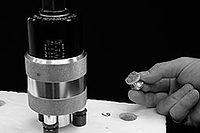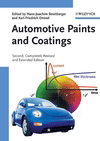Industry 4.0: the Latest Advancements in Car Coating Technology
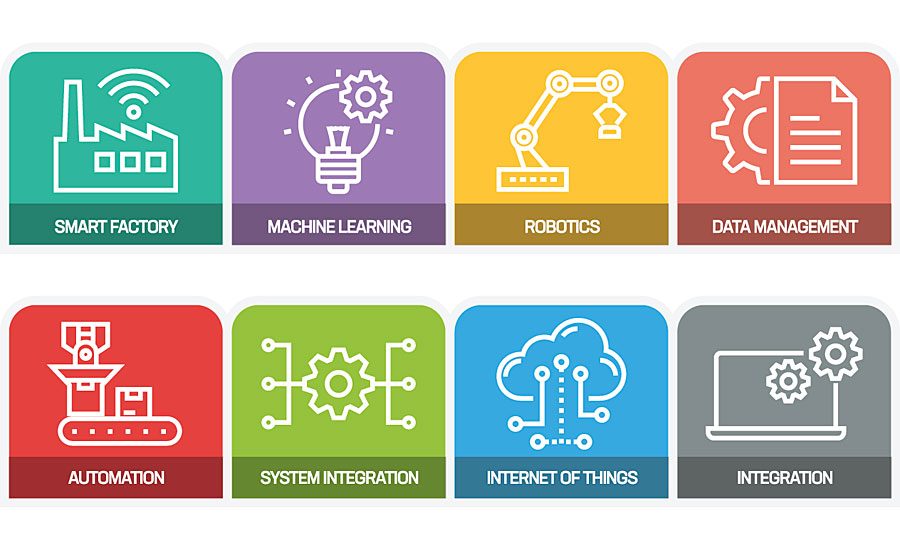
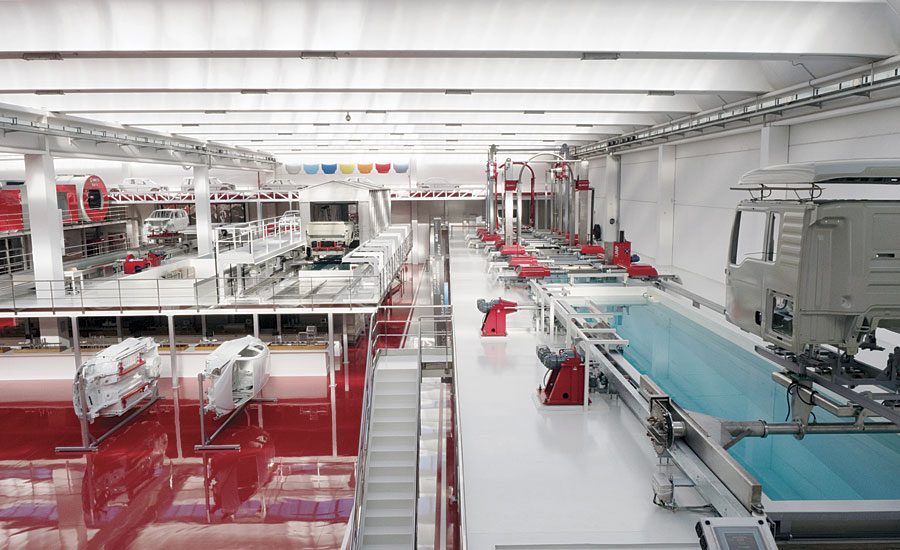
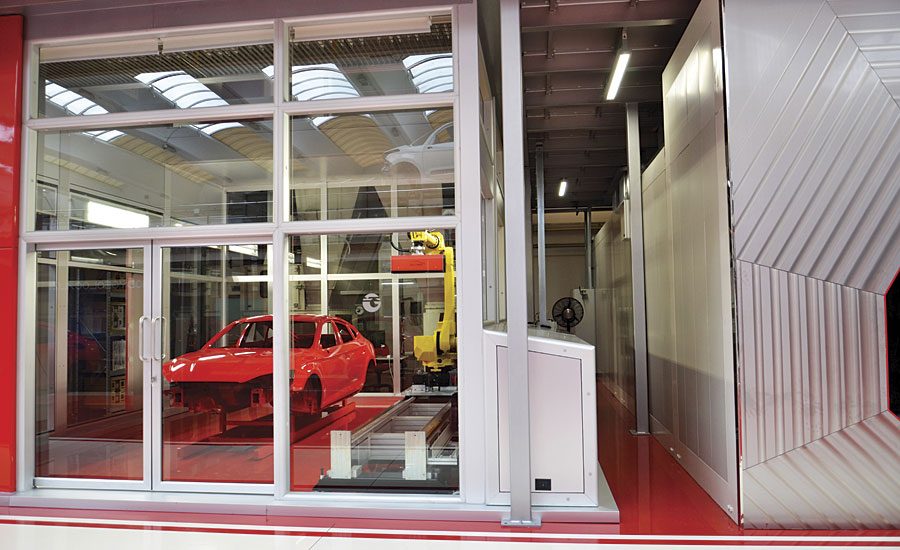



Industry 4.0 has had an enormous impact on how manufacturers are rethinking their production processes at every single phase. Highly innovative trends and a demand for new developments have led to a number of industry players researching and developing groundbreaking solutions to car coating plant systems. Indeed, with new Industry 4.0 concepts the objective is to develop facilities that will increase in efficiency as time passes through data accumulation being fed to systems, in turn helping technology to become “smarter.” GeicoTaikisha is one of the companies leading the way, with the introduction of its “Smart Paintshop” system.
The Smart Paintshop
The Smart Paintshop Project is a set of acclaimed solutions that represents GeicoTaikisha’s philosophy of innovation. A revolutionary painting system introduced to the market in 2016, with the goal to provide clients with a revolutionary solution for efficient and timely paintshop delivery for any green or brownfield project (retrofitting). It is a complete, 360-degree linked production system, an auto body painting system that provides high-performance efficiency, safety, quality, cost savings and environmental friendliness from start to finish.
The Smart Paintshop consists of an integrated system of six strategic solutions, which GeicoTaikisha represents as a Greek temple. The base is composed of the company’s Smart Design, on which everything rests. The temple’s four pillars represent practical themes drawn from the focus of the company’s work. These in turn support the roof – the J-Suite system – a “Digital Twin” of the facility or plant that makes possible proper control, planning and integration of all these elements. In more detail, these are:
1. Smart Design (the Temple Base) – Developed by GeicoTaikisha in-house, its goal is to create a flexible and adaptable web-based platform that allows to drastically reduce auto body paint plant delivery times for customers. Indeed, the system works with clients right from the onset and can be adapted as the project develops and specifications evolve. Self-adaptable 3D drawings in the system help visualize the evolution of the plant and the interrelation of its components, allowing the company to plan and plot workflows from the very start. Another unique feature is that the system will be directly linked with suppliers, with material specifications and costing information pre-populated, so as changes to the design are made, all these elements are recalculated in real-time. This allows for customers to be able to customize design, closely oversee budgets and limit delivery delays.
2. Internet of Things “IOT” System (Temple Pillar I) – The IOT system allows the plant to use simulation and virtual reality processes to collect and analyze information (Smart Process Skid), geolocate car bodies through cableless technology as well as communicate with workers and receive their feedback, making operations more efficient. With the ability to process big data, the system allows GeicoTaikisha to establish base settings for the equipment and model workflows in the new plant. In fact, the integration of each element within the plant is accomplished while equipment is still being delivered and installed, so time is saved and new plants can be operational with minimum delays.
Additionally, continuous communication between the different elements in the paint process – the oven, air quality, application and so on – can be adjusted automatically or trigger operator intervention.
3. Production Flexibility (Temple Pillar II) – Three key technologies offered to clients through this pillar include: 1) the ELastic ENergy Ecology (ELENE), a system to easily adjust booth ventilation and operations based on production needs; 2) the J-Hive, a compact, octagon-shaped customizable painting booth and; 3) the Smart Conveyor, an Automatic Guided Vehicle (AGV) for moving car bodies within the factory.
To meet fickle consumer demands, customization and production changes are critical in today’s industry. The Smart Paintshop provides technologies that allow the plant to adapt to varying production requirements and mass customization. Facilities need to be flexible for processes to be readily reconfigured, and so with new, linked digital technology, GeicoTaikisha is making this more doable. For example, digitally linked systems enable customers to model the effects of different specifications and requirements easily and then implement them through a modular layout that helps easily adjust production lines, departing from the linear production workflow model. This also allows factories to easily divert body shells for remedial work without disrupting production.
More importantly, the Smart Paintshop is a fully adaptive system, capable of anticipating, learning and adjusting parameters and patterns of movement as data is amassed.
4. Smart Plant Management (Temple Pillar III) – Naturally, different conditions of operations and changes in production models place different strains on components. To solve this, a range of systems developed by GeicoTaikisha make it possible to establish the kinds of communication structures that are necessary to maintain and operate complex production facilities; tools that allow man and machine to continuously collaborate and monitor plant operations to help the production process to run smoothly, identifying any anomalies that might compromise them through a self-diagnostic function. As well as assets that give plant managers the ability to ensure quality and effectively diagnose potential issues that can be easily and immediately course-corrected.
One of the objectives in developing the Smart Paintshop was to empower the workforce. The system allows for technicians to enhance their skills, utilizing and sharing their experience, providing them with the ability to maximize and enhance their roles with the aid of groundbreaking digital technology, inclusive of wearable devices that assist in both the design phase and operations. For example, with Quality Control, it is not just a question of defect identification. It instead involves the automatic networking of this defect information to operators through an augmented reality facemask that in turn incorporates their evaluation and input during the rectification process to variables. It is also important to note that the new technology provides additional safety for the workforce.
5. Smart Energy Management System (Temple Pillar IV) – A suite of technology offerings that control energy consumption and can be adjusted to match production capacity. This includes the VOC Intelligent Sensing Over, allowing sophisticated control of a fresh air supply and the drying processes, with significant reduction in energy use and enhanced flexibility. The other technology available to clients is J-Power, a software that can be configured to allow the input of data from local energy providers and is continually adapting to change requirements and new data. By doing so, the entire factory’s energy usage can be monitored and adjusted (including maintenance intervals and component replacement schedules), helping to identify solutions to maximize performance, ensuring sustainability and minimizing costs.
6. J-Suite (Temple Roof) – The brains and central operating system of the plant is a virtual “avatar,” or information hub, which ensures everything operates effectively. From the very planning stages of the plant, J-Suite applies simulation techniques that assist in the commissioning and implementation processes with the help of a customized Manufacturing Execution System. This can begin with a “zero state” simulation that allows the company to bring the plant on stream without any delays. The system collects and analyzes an enormous amount of data from sensors and wearable devices, “learning” to adopt the best courses of action in a variety of circumstances and improving plant efficiency and performance over time. J-Suite allows for adjustments that can be easily made to reflect new production and customization requirements. Based on its “learned” mechanisms, the system then automatically recalibrates production in the most efficient model possible, resulting in the likes of delivery time and energy savings optimization.
Implementation
Historically, larger manufacturers would be hesitant to implement and test production models such as the Smart Paintshop. Indeed, smaller manufactures would be more open to doing so, paving the way in terms of innovation. But nowadays J-Co America is experiencing less division. Market pressures are now such that they cause all players to respond to the benefits that digitally linked systems can offer. In fact, companies are seeing how optimizing production processes with new systems makes smart business sense, and how products like the Smart Paintshop bring value to plants with the maximizing of the collaboration between man and machine. This is not just about cost reduction. It is about energy savings, maintenance, quality, flexibility and time-to-market. To this end, J-Co America is building the auto body paint shop of the future in record time. It used to take up to four years to develop a new production model, but with the advances in technology and products like the Smart Paintshop, it now takes up to 18 months at maximum for the more complex plants. A quite impossible target just a few years ago.
Many long hours of research and high-level engineering, next-generation technology, passion and commitment are what made the Smart Paintshop project surge ahead to garner the prestigious Innovation Award at Surcar Cannes 2017, the highest accolade in the sector at the “Olympics” of auto body painting.
For more information, visit, www.geicotaikisha.com.
By J-Co America, Troy, MI
Looking for a reprint of this article?
From high-res PDFs to custom plaques, order your copy today!






